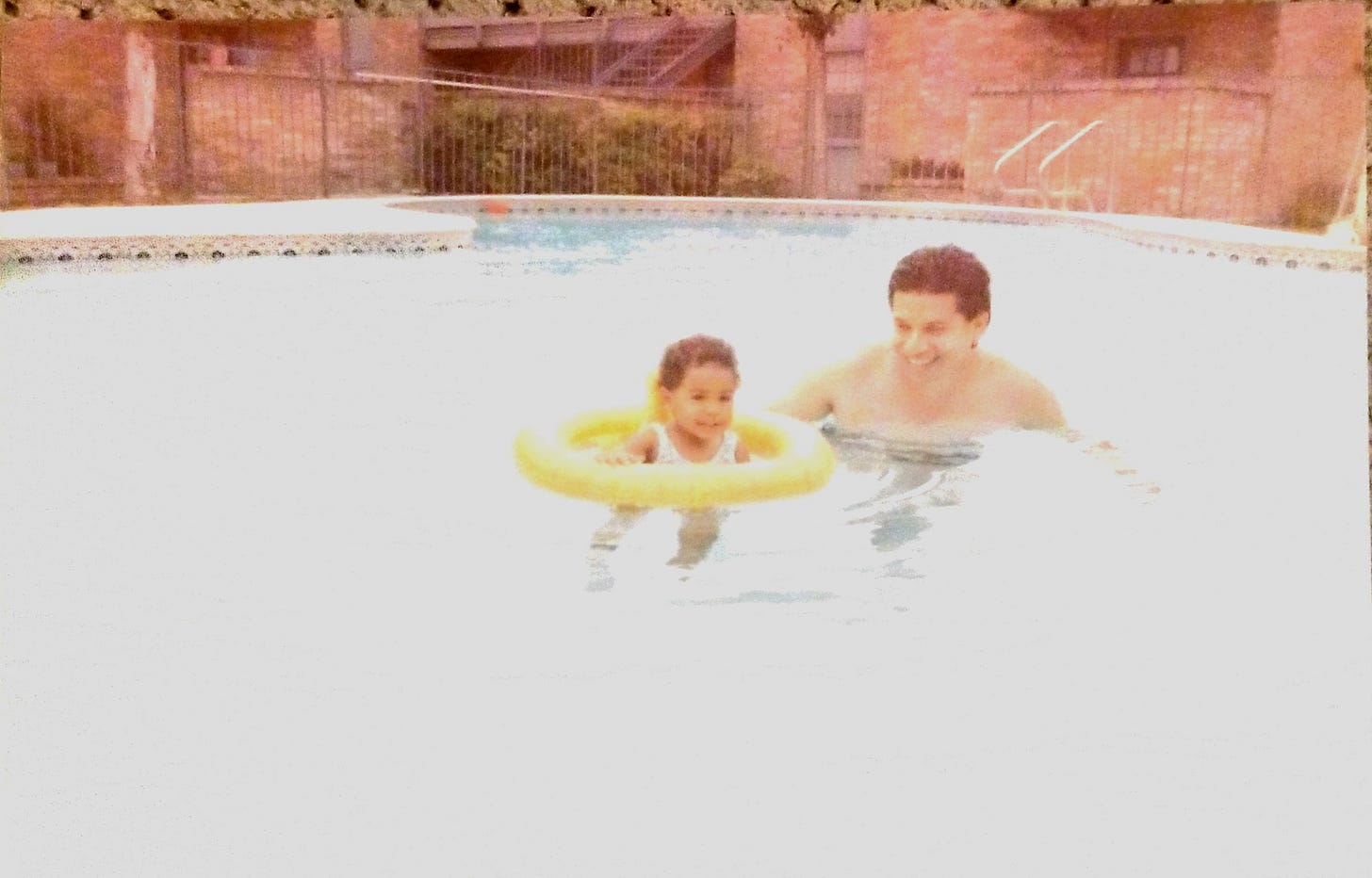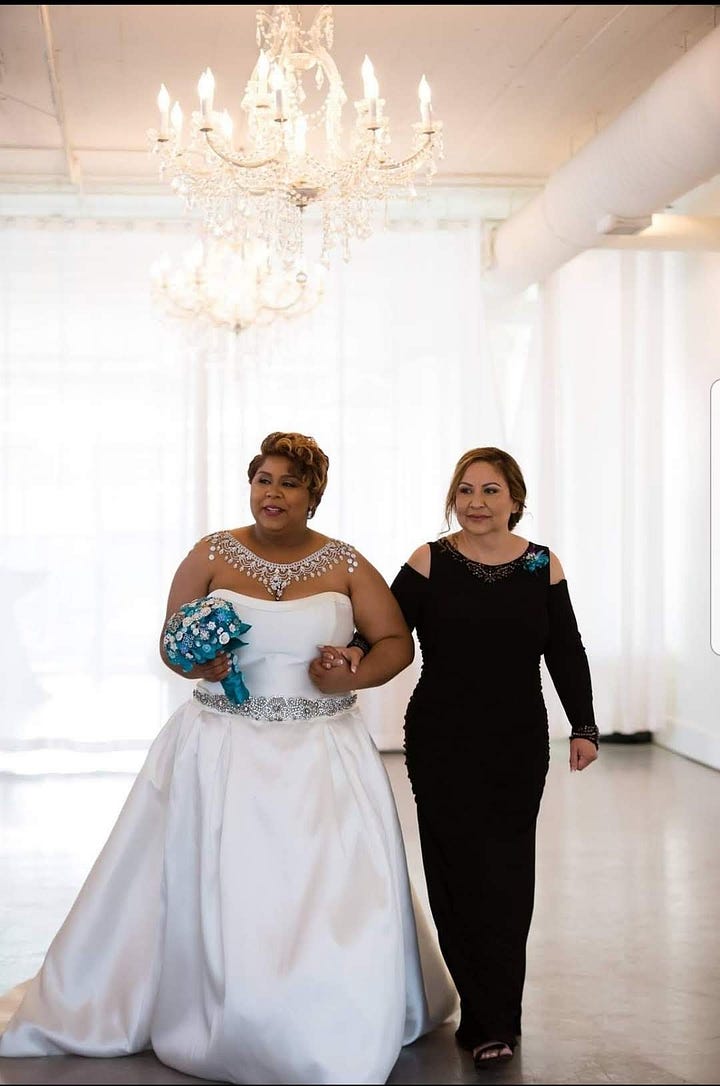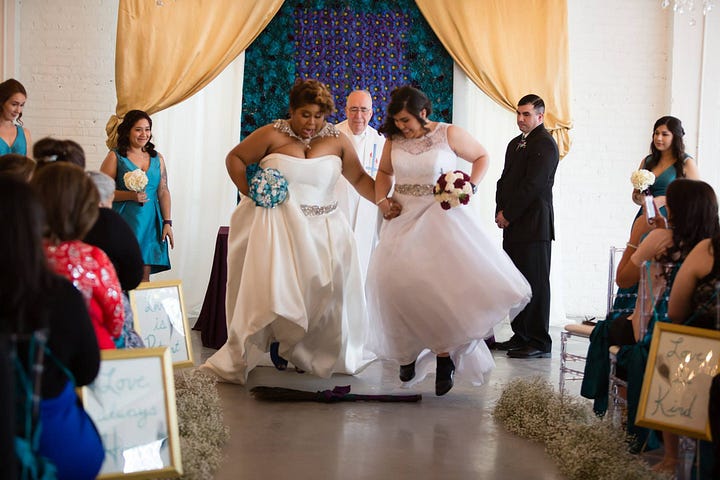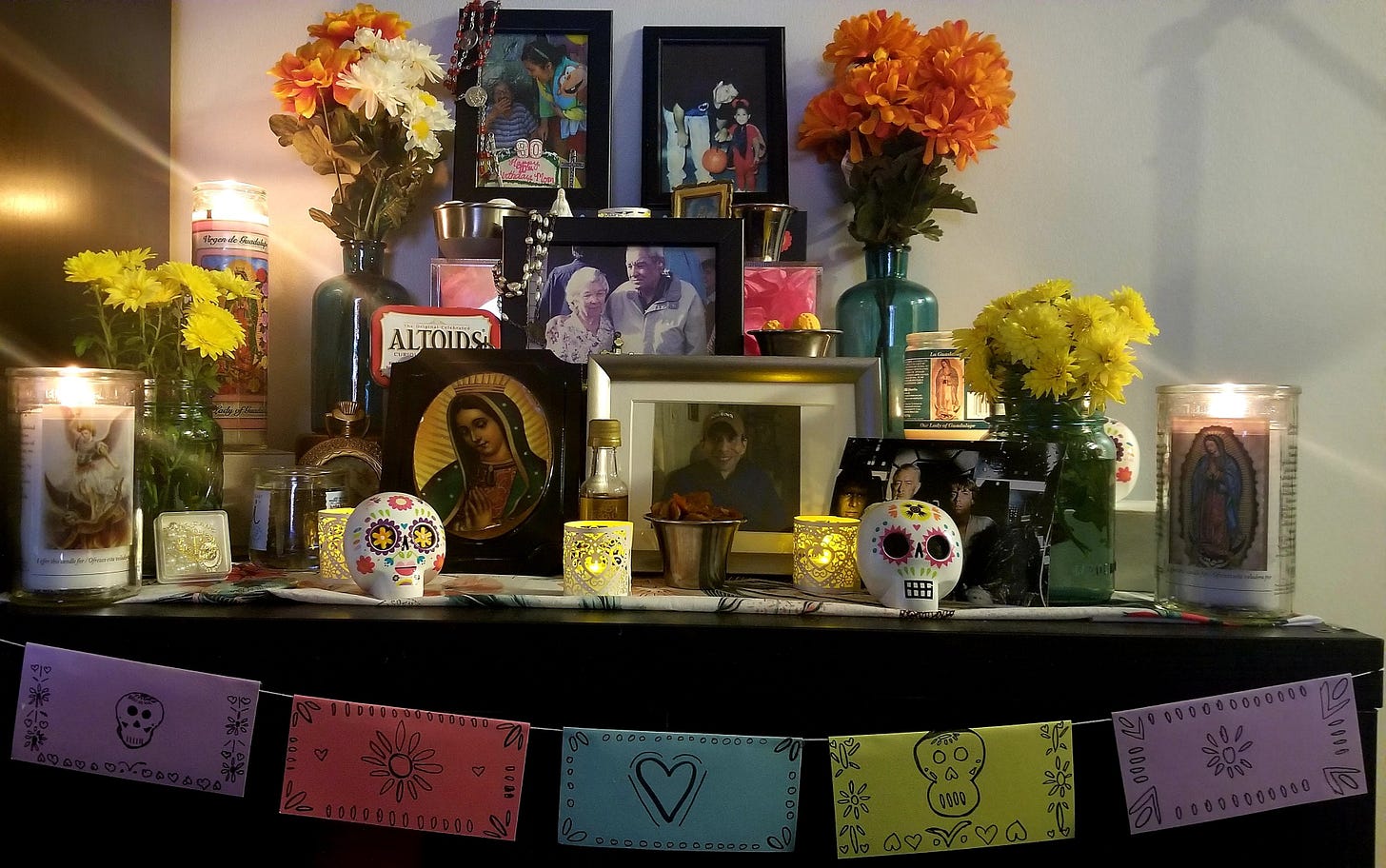[T]his year at Juneteenth, as you take a long swallow from a cool drink of hibiscus iced tea, or red punch, remember the ancestors who sacrificed, remember the bloodshed in the struggle, remember the collective strength of people of the African diaspora, and finally remember the spirituality and transcendent joy that enabled us to overcome.
~ Kelly Navies, museum specialist, and oral historian1
This Juneteenth, as we celebrate our liberation, strength, and joy, I also want to underscore the grief our community still endures and the importance of recognizing said grief. As detailed in the subtitle, this post deals with some heavy stuff, so no hard feelings if you decide to skip it! This will also be a relatively long piece, so if you decide to read, feel free to grab a cup of comfort and settle in.
This past week marked the three-year anniversary of my dad’s death in June 2020. June 2020 also marked a heightened awareness of police brutality nationwide, coupled with civil unrest and protests that were potentially the largest in U.S. history. Today is Juneteenth, our independence day, and a day of celebration and reverence. This month is Pride Month, the month we LGBTQIA+ folks also commemorate those activists and leaders like Marsha P. Johnson, Sylvia Rivera, Stormé DeLarverie, and Miss Major Griffin-Gracy, and remember that the first pride was a riot! Lastly, this past week marks the seventh anniversary of the Pulse Nightclub shooting.
Needless to say, June is a tough month for me. In dissecting these feelings of fear, loss, pride, and pain, I realized how much the normalized definition of grief excludes. This exclusionary and binary definition of grief gives way to a liminal space where one can’t quite find one’s footing, where our grief isn’t recognized, and where we struggle to exist. I’m not a mental health expert, so much of these musings will be my lived experience. I am, however, the lucky partner to a fantastic licensed psychotherapist, and we will be digging deeper into what it means to queer grief in the next post, so subscribe to Our Queer Universe so you don’t miss it. Until then, I’d like to try to untangle the intersecting feelings of grief due to bereavement, collective grief, and grief due to persecution.
Once I left home for college, Daddy made it a point to call at least once a week. They were always short calls; he was a man of few words. I’d often send him to voicemail because the calls were so painfully awkward and usually revolved around the same topics: the weather and the shows he was watching. “Ah-LEX-AH the weather in SAAN AANT-OH-NEE-OH,” my dad would deliberately enunciate while on the phone with me, with Alexa more frequently responding with “Sorry, I don’t understand” as my Dad’s MS progressed. When I started dating Em, our weekly calls became dotted with “yeah, I’m hanging out with Em” or “Em and I are studying for finals.” And when I finally decided to ovary up and come out to my dad, before I could even get the words out, he said, “I already know you and Em are dating.” He was the first person in my family I came out to, and he made me feel loved despite my differences: and oh, were there so many differences.

My dad adopted me when I was around four years old. My mom recalls the judge asking me, “Who is your dad?” and “Do you want him to be your real dad?” I must’ve said the right thing because my surname changed from Cobb to Esquivel to match my sister’s. My grandparents also welcomed me with open arms; I was their granddaughter, and they loved me as such from the beginning. I start these reflections with love and acceptance because I know wholeheartedly that, as sure as I know myself, my dad and grandparents fiercely love me. I think this is why my emotions are so convoluted, but let’s parse through them together.
While my dad was the first to know I was Queer, my grandparents were the last, even though my dad lived with my grandparents and had virtually met and spoken with Em for many months prior. I chalked up their disproval to a generational divide and held steadfast to knowing they chose to love me even though I wasn’t “theirs.” Eventually, they were nice enough. Grandma was more welcoming to Em than Grandpa, which made sense as Grandpa is a pastor at a non-denominational church. I convinced myself that that was enough and that it was ok to ignore their lack of acceptance of my being gay because it was overshadowed by the fierceness they loved and accepted me as their own, even though I didn’t look like them.
Then the Pulse Nightclub shooting happened. I remember staying up late, holding Emily, and just crying, consumed by fear of what was to come. The time between that horrible day and the reigning of the Trump administration feels so compressed in my head as if they had happened simultaneously. I think this time dilation results from such a dichotomy between how I viewed my grandparents’ love of me and their vehement support of someone so toxic to my well-being. While I grieved so many lives lost due to hate, the weekly calls continued, and on these calls, I dutifully ignored the real terrors of the world for someone like me and played along. My grandparents were vocal advocates for Trump, sporting MAGA paraphernalia and eschewing Fox News quotes like robots. As I said before, my dad was a man of few words, so to this day, I don’t know: 1. if he voted for Trump or 2. If he voted at all. All I know is that while I grieved during the 2016 election, they celebrated. And still, I ignored this pain, subjecting myself to weekly calls from my Dad and cheerful commentary from my Grandpa about how his presidential pick won. Christmas time would come, and Em and I would head down south. I both looked forward to and dreaded seeing my dad and grandparents in person because as much as I loved and missed them, it meant fracturing my reality to align with theirs, and I lost a bit of myself every time that occurred.


In 2017 Em and I got married. My wonderful mom walked me down the aisle; my dad and grandparents weren’t in attendance. A large part of me knows it’s because I was marrying Em. But I convinced myself it was mainly due to my dad’s MS and the difficulties of travel for him, and if it weren’t for that, and if my dad had more autonomy, he would’ve been there despite the views of my grandparents.
For four years, I pretended my relationship with my grandparents was hunky dory because I saw the disease ravaging my dad’s body and recognized that every minute I had with him was precious. Even then, I still regret not spending more time with him. I should also mention that at the exact same time, I entirely cut a family member out of my life who refused to acknowledge the harmful rhetoric Trump uses and the danger marginalized people are facing due to inciting hate.
But when my dad died, the facade came crumbling down, and the reality was too bright. It was like the pain you get from staring too long at the sun. I hadn’t coped with the grief due to persecution, the collective grief of the LGBTQIA+ community, the resentment of hiding in plain sight, or the repressed anger of knowing those that are supposed to love you unconditionally vote in a way that puts your existence at risk. All of these repressed emotions flooded consciousness and coupled with the very salient collective grief of the Black community on the heels of multiple murders of Black people by cop. There are many layers of grief that I’m combatting, but few, if any, align with the concept of normative grief.
Sophia Rose Longo, in their thesis Even as a Dream: Feminist and Queer Grief, Ritual, and Futurity, details the drawback of trying to create a rigid framework for conceptualizing grief. They highlight Kübler-Ross’s five stages of grief — denial, anger, bargaining, depression, and acceptance — and discuss how this model has been used to quantify grief, something unquantifiable, and transform the process of grieving to a goal-oriented approach with the end goal of moving on from said loss and thus being cured.2
Superficial understandings of the theory produce the general expectation that grief will not leave the boundaries of these five recognizable emotions, that these emotions will be processed in exactly that order, and that grief is a finite experience that will be completed and reconciled once all five stages have been successfully cleared (407).
This rigidity in how grief should manifest and how fast one should move through the grieving process relegates those of us who don’t fit into this binary understanding of grief to “disorder status.” In fact, according to the Diagnostic and Statistical Manual of Mental Disorders (DSM), prolonged grief disorder3 is one of the newest disorders to be added to the manual, and it manifests when people are dealing with “persistent difficulties associated with bereavement that exceeded expected social, cultural, or religious expectations.” Yet this rigidity, the individualized grief process, and the grieving timelines actually vary widely based on culture, geography, and religion.4 For example, in the Mexican culture, we embrace death as an integral part of life, and as such, grief isn’t time-bound. Sitting in our grief connects us to those we’ve lost, and every year on Dia de los Muertos, that is exactly what we do. We relive moments, retell stories, and reconnect with those we’ve lost.

Sophia Rose Longo highlights Green and Grant’s definitions of problematic5 and disenfranchised6 grief and expands on these with their own definition of queer grief.
Queer grief: expands on disenfranchised grief and stems from circumstances and experiences that are shaped by stigmatization, shame, systemic oppression and marginalization, and targeted violence in life, death, and bereavement.
Queer grief allows for fluidity and freedom in the process. It encompasses not only the death of a body but also collective grief and trauma due to targeted violence. Longo states the “central force” behind the development of queer grief is embedded in the notion that, as Sara Ahmed writes, “queer lives have to be recognized as lives in order to be grieved.” This lack of recognition of queer lives leads to double violence: in life, we aren’t able to die because our lives aren’t recognized, and in death, we aren’t able to grieve because how can one die if we aren’t allowed life.
The theory of queer grief mirrors the fundamental theories of physics at the quantum scale and again offers a motive for imagining the universe as queer7. The idea of rejecting binary and normative definitions of grief and accepting a more fluid approach to the process draws many parallels to physicists’ understanding of quantum mechanics. This parallel is further strengthened by Longo’s assertion that queer grief is the antithesis of normalized grief which “ must take linear, clearly separated, temporally bound, and easily recognizable forms in order to avoid pathologization and disenfranchisement.” Like queer grief, the fundamental physics at quantum scales is inherently non-linear or temporally bound (e.x, quantum superposition), unrecognizable at macro scales, and exceptionally interconnected (e.x, quantum entanglement).
The last concept I’d like to highlight, as well as compare to quantum mechanics, is that of crip8 theory and using said theory to further queer grief. I wasn’t aware of this concept, and I thank Longo for introducing me to it. Crip theory, developed by Robert McRuer, is rooted in crip activism and rejects compulsory able-bodiedness just as queerness rejects compulsory heteronormativity. Longo describes crip theory as offering insight into the violence marginalized communities face, including the “devaluation of certain lives and the invalidation of grieving their losses.” Alison Kafer goes on to expand on crip theory by developing the term crip time:
Crip time…requires reimagining our notions of what can and should happen in time, or recognizing how expectations of ‘how long things take’ are based on very particular minds and bodies.
I’ve previously touched upon the difference in perception of time, specifically related to colonial time9 and the need to prioritize productivity over humanity. Crip time echos the different perceptions of time and underscores the fluidity of time across spacetime, and rejects the binary categorization of time only being perceived by able-bodied individuals. Crip time also rejects the idea of inevitability and applies queer theory to crip theory. Not only does crip time interrogate how long things should take, but also how long those with chronic diseases should live. I view this notion of time personally in two instances: as a way of connecting to the larger disabled community and validating my experience as I suffer from time-blindness due to ADHD and perceive time wholly differently than my neurotypical counterparts (I discuss this and the connection to quantum mechanics in my TEDx talk The Queer Universe: A Quantum Explanation), and as the way I let normalized time infiltrate my perception of it and fell into the trap of believing that time spent with my dad was finite and ever evaporating because of his disability: a shame I’m still sifting through.
In conversation with Kafer, Ellen Samuels digs deeper and draws comparisons between crip time and grief in Six ways of looking at Crip time10. Samuels’ different perceptions of crip time to me is read in concert with the theory of multiverses, of many timelines living in harmony. Two ways of crip time that Samuels writes about are crip time as time travel, and crip time as grief time:
Crip time is time travel. Disability and illness have the power to extract us from linear, progressive time with its normative life stages and cast us into a wormhole of backward and forward acceleration, jerky stops and starts, tedious intervals and abrupt endings.
As mentioned above, my time blindness is a manifestation of crip time. I also have made connections between ADHD and Quantum Mechanics, so it is an easy extension to see how crip time is also time travel. I always describe my bouts of hyper-focus, often coupled with time-blindness, as falling into a black hole. While I recognize the ramifications of crip time in a neurotypical and able-bodied world, I also revel in the otherworldly innovations I uncover while in that black hole. The reclamation of crip time as being able to give us the power of time travel aligns with my experience of ADHD, making me the highly successful physicist I am today.
Crip time is grief time. It is a time of loss, and of the crushing undertow that accompanies loss. I lost my mother when I was twenty and she was fifty-two, to a cancer that she had lived with for fifteen years. But those numbers don't say anything about the way the days slowed and swelled unbearably around her death, or how the years piled up afterward, always too much, never enough. When I fell ill just two years later, both doctors and relatives wanted to believe it was the result of my stored-up grief, my refusal to stop mourning my mother and move on with my life.
Just as multiverses can co-exist, crip time can be more than one thing. Samuels’ description of the days both slowing and swelling around the death of her mom is so visceral as it is the same experience I dealt with my dad. It was such an all-consuming feeling that I ignored the violence of fracturing my identity and relegating my queerness to the side. As Longo states, Samuels’ dissections of crip time give one a path towards “refusing the violent erasure of supposedly-ungrievable los[s].”
As I move through my queer grief, grieving the loss of my dad, and the collective grief of both the Black and Queer communities, I intentionally sit in the emotions that, for so long, I obscured and give them space to be. As I move through queer grief, I acknowledge how interconnected each path is, how valid each path is, and how fluidly I can traverse all paths. In highlighting this fluidity, I end this post with a video project I finalized just days after my dad’s passing: a project to celebrate the amazing Black women in physics, shared with the world on Juneteenth 2020. These women held me in community throughout the collective grief we were all consumed by, as well as the individual losses many of us were dealing with during the covid pandemic. As I move through my queer grief, I celebrate all that we’ve overcome and all that we will accomplish.
Problematic grief: When individuals tend not to behave in the ways expected, for example, where the grieving process is inordinately lengthy, delayed, experienced as emotionally debilitating, where it does not involve moving on from the relationship with the deceased, or where emotions are masked, the reactions are often labeled as complicated, abnormal, or pathological. […] Recognition has grown about the shortcomings of labeling certain reactions to bereavement as abnormal and pathological, but the social context has largely been omitted when these shortcomings are identified.
Disenfranchised grief: Doka (1989: 4) first defined disenfranchised grief as experienced ‘when [people] incur a loss that is not or cannot be openly acknowledged, publicly mourned or socially supported’. [I]f grief is not socially sanctioned, it does not elicit the same degrees of support from friends, family or professionals, or may not even be overtly expressed. […] [D]isenfranchised grief is deemed inappropriate, illegitimate, unnecessary or irrelevant. This moves from a situation of merely being ‘passively unaware’ to ‘a more active situation of disavowal, renunciation and rejection’.




